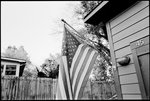

When Pittsboro resident Monnda Welch heard about the Jan. 6 insurrection at the Capitol, she was angry.
Like many people, she was angry to see violence committed in the name of a false cause and a lack of preparedness by law officials to respond.
What made her angrier still was the slew of American flags and patriotic messages at the Capitol riot. She served in the U.S. Air Force during the Vietnam era. So had her husband, Richard Brothers, who died in 1992 from complications wrought by Agent Orange exposure. For Welch, patriotism is deeply important — but it’s not what she saw displayed in front of the Capitol.
“It’s been hijacked,” she said. “The patriotism that we had for the last four years was toxic.”
Welch entered the military when she was 18 in 1966, and was honorably discharged the next year when she got pregnant. During that time, she was frequently one of the only women in many spaces — something she said took “some strong backbone.” Her husband remained in the service; the couple paid for schooling and their house with military benefits. Her daughter, Anna Brothers, retired from the U.S. Coast Guard last June after serving for 20 years.
Nearly three months have passed since the Jan. 6 riot, but Welch takes seriously what she sees as a distortion of patriotism.
“If you see a flag flying now, it represents to some folks’ minds, Christian conservatives who are also patriots,” Welch said. “That offends me a lot, because I’m not any of those. And I certainly do have the right to fly my flag.”
Nearly one in five people charged over their alleged involvement in the Jan. 6 Capitol riot has some military history, according to a Jan. 21 analysis by NPR.
Welch referenced that report, and said it represented a hijack of “healthy” patriotism. To her, healthy patriotism means not confusing pride in a country with pride in its government.
“There’s a difference,” she said. “This country is very beautiful. We also do some really hellacious things to it.”
In Chatham, many residents — veterans and civilians alike — have supported what took place Jan. 6, and the events and narrative of patriotism that led up to it. Still, local Republican and Democratic leaders alike condemned the Capitol attack. While the Chatham County Republican Party questioned the news coverage outside the Capitol in a Jan. 6 Facebook post, it said it was “adamantly opposed to the break-in at the Capitol.”
“We are also sure that 99% of the people at the protest did not break into the Capitol,” that Jan. 6 post said. The group affirmed the electoral votes and a peaceful transition of power in another post the next day.
For Welch, the number of people who did break into the Capitol — and who supported it — is disturbing enough. She also thinks toxic patriotism is largely to blame.
Welch thinks travel outside of the country — she visited England, France and Wales in 1989 — most influenced her healthy sense of patriotism.
“The travel and education that afforded me showed some weak spots that I had,” she said, “and thinking I viewed as a typical American response — that we’re the most educated, have the best health care, the best transportation, the best yada yada yada.
“When I traveled I looked around and I thought, I’ve got to rethink some things here. So the travel (made) the patriotism more realistic.”
For Welch’s daughter, her sense of patriotism quickly evolved after she entered the military in May 2000. She’s proud of her service and of her country, but thinks patriotism has been muddled with nationalism.
“Patriotism used to be pretty clearly linearly defined as, I love my country, not I hate every other country,” Brothers said. “I am super proud of my service, and of my country and what I believe it still stands for. But nationalism has given a little bit of a black eye to the sense of patriotism — it’s acquiring a negative connotation.”
People have always identified with a collective population, UNC-Chapel Hill history professor Lloyd Kramer told the News + Record, but modern nationalism is a more systematic attempt to give people a sense that their national identity is their most important identity. Kramer’s research focuses on modern European history with an emphasis on nineteenth-century France. There are two strands of nationalism, he said: one that stresses racial, ethnic or linguistic origins, and one that stresses identification with a set of values or principles.
“These two kinds of nationalism, let’s call it ethnic nationalism and civic nationalism, have always been in conflict in some ways,” he said. “What we’ve seen in the United States is the same thing. The history of the United States, when it comes to nationalism, is an endless struggle between people who have tended to define the nation in ethnic or religious or racial terms, against people who have sought to define the nation in civic terms ... the rights of human beings, the rights of immigrants, the rights of inclusion — no matter where you came from, if you choose to be part of the nation.”
“It’s pretty obvious the two strands we’re dealing with right now,” he added. “There’s a lot of anger and emotion because both sides are convinced that they represent the true meaning of the nation.”
While both strands of nationalism reinforce the idea of American exceptionalism, Kramer said the people most often talking about such exceptionalism today stress “blood and soil and language and Christianity” that is much more like Europe than the U.S.
“There’s a kind of white Christian nationalism now that replicates certain kinds of religious, racial ethnic nationalisms that have long existed in Europe,” he said.
Claude Clegg III, a history professor at UNC-Chapel Hill who primarily studies Black nationalism and Pan-Africanism, said patriotism is typically more inward-looking than nationalism.
“Nationalism is more outward facing, valuing one’s own nation or group identity above those of foreign people or outsiders,” Clegg said in an email interview. “Like patriotism, nationalism thrives on simplistic narratives about identity and belonging and tends to overemphasize certain shared identity markers (such as religion, race, language, etc.) over differences within that group (such as class, gender, etc.).”
Clegg said nationalism in places such as Africa and Asia provided the ideological foundation for national independence movements against imperial rule. Still, in other places, nationalism has led to world wars, forced mass migrations and even genocide.
“The only positive nationalism is one that is merely an instrument for freeing people from oppression,” Clegg said. “Beyond that, nationalisms that merely seek to divide or to overemphasize differences between people and societies for whatever reasons generally lead to problematic outcomes.”
Such outcomes can be seen at the Capitol insurrection, even with videos of many participants who believed they were being patriotic by following what they believed to be instructions from then-President Trump. Since they were acting on false narrative about the election, Clegg said, these people — regardless of varying ideological views concerning the rebellion — were insurrectionists against the U.S., placing them “at odds with any credible notion of U.S. patriotism.”
For Brothers, this false patriotism left her conflicted following the Capitol riot.
“I was embarrassed by that yahoo with the horns on his head, because of how every other country in the world must have seen that and thought, ‘Holy smokes, what is happening to America?’” she said. “I didn’t do everything I did for just over 20 years, so that we can embarrass ourselves.”
While she doesn’t identify with the flag waving seen outside the Capitol that day, Brothers emphasized she is very patriotic. She’s grateful for America and branches of the U.S. military, and isn’t embarrassed by that. (She also recommended Battle Buddies USA Facebook group for other veterans for advice, resources and other opportunities.)
But she wants people to stop confusing patriotism with nationalism — something Kramer said is easy to do in moments of crisis.
“I see the Jan. 6 conflict as simply the latest example of a recurring battle in America,” he said, “between ethnic and civic conceptions of American national identity.”
Another element of the Jan. 6 riot that concerned Welch was the Christian messaging and symbolism she saw. Raised Irish Catholic, Welch is no longer religious but considers herself spiritual. Not only was the insurrection a perversion of patriotism, she said, but also of Christian faith.
Eliza Brinkley, a Chatham resident and teacher, was similarly disturbed by the display of Christian symbols. Following the Capitol attack, she updated her Facebook profile picture with a frame opposing Christian nationalism.
Brinkley grew up in the Episcopal church, so she said she didn’t grow up with the evangelical fundamentalist perspective where she said “a lot of this extremism comes out of.”
“Looking at some of this real extremism, which is different than just conservative, it’s pretty alarming,” Brinkley said, emphasizing she has plenty of friends who consider themselves conservative Christians.
In particular, she remembers seeing signs from the riot that read “Jesus 2020” — signs she said epitomize the inflation of political and faith identities.
“It’s just bizarre, it’s kind of like, instead of worshiping Jesus, you’re worshiping America, and not even just America, but a specific kind of America,” she said. “It’s also unfortunately perpetuated by this idea that that version of Christianity is superior — and therefore everyone needs to abide by it and everyone needs to look like that. And I think that’s really problematic.”
She was particularly troubled by people at the riot performing violent acts in the name of Christianity.
“That’s not who Jesus was,” she said. “Jesus was certainly a revolutionary figure, but he was not about attacking people for being truthful, or speaking to their personal beliefs. There’s so many parts of his message that are all about welcoming others, right? Whether it’s about a Samaritan, or a Gentile or the poor, Jesus’s example to us should be about letting people in, not about pushing them away or condemning them.”
For Brinkley, who believes patriotism is about working to uphold the country’s values — freedom to protect life, liberty and the pursuit of happiness — the events that led to Jan. 6 make it harder to feel patriotic, or be open about her faith. Though months have gone by, it’s still something she struggles with.
“I’ve always had a difficult time telling people that I’m a Christian, I don’t have a difficult time telling people I’m a Episcopalian,” she said. “I’m worried about being pulled into that same group with people that were storming the Capitol. I’ve tried to work recently on being OK with saying, I’m Christian, claiming that identity fully.
“But this makes it harder. And I think even more importantly, it makes the church seem less and less like what it should be.”
Kramer acknowledged this type of white Christian nationalism, adding there are many white Christians who are not nationalists. But in America, he said, the white nationalist Christian narrative argues that America was founded as a Christian country, or that the essence of national identity is Christian identity.
“For many decades, for centuries even, this white, Christian Protestant identity has been concerned, been angry by the arrival of people who are not part of that identity and are therefore seen as not really American,” he said.
“The group that sees the nation defined primarily by religion, and also by race, can see that things are not going their way if we follow the majority rule,” Kramer added. “So there is a willingness to overturn elections, to protect something that’s more important than democracy. That’s why January 6 is not just a blip — it is part of a much broader struggle about the meaning of the American nation.”
Reporter Hannah McClellan can be reached at hannah@chathamnr.com or on Twitter at @HannerMcClellan.